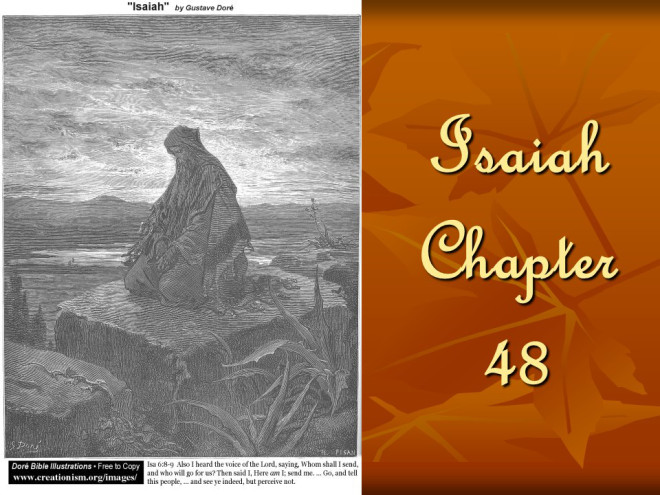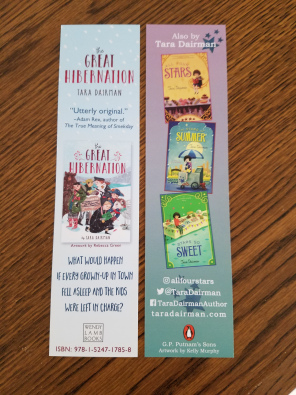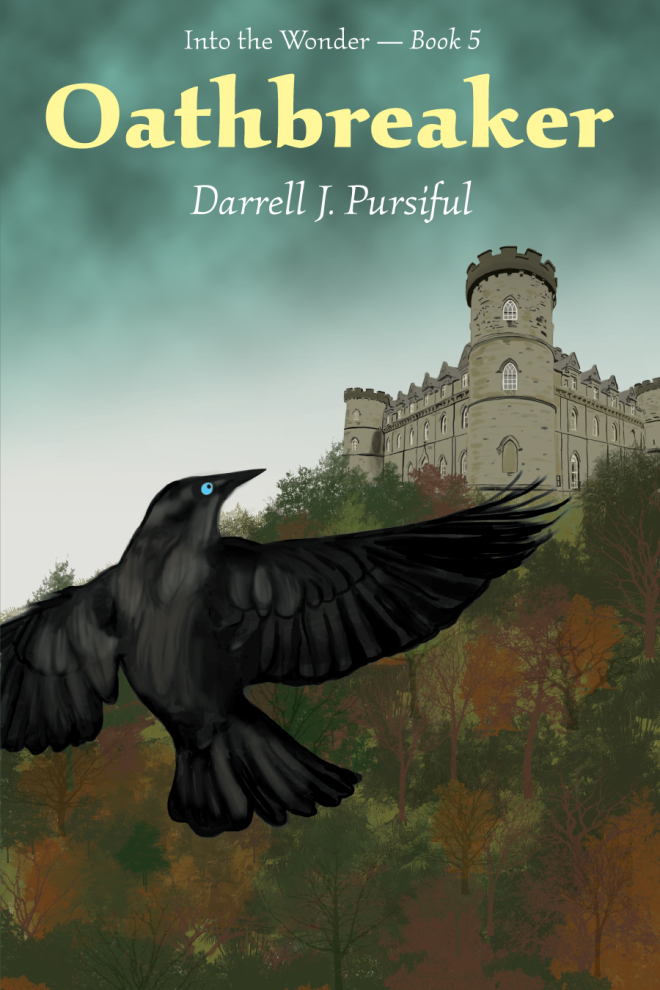
by NONA BLYTH CLOUD
Heartbeat. The drum of human life. No matter who we are, where we were born, or how we live, it is the rhythm of each of our lives.
The Native American women poets who are today’s subjects are from different tribes. Their lives are not alike, but they share with each other, and with all the rest of us, the birth of new life, and the deaths of loved ones.
________________________________________________
Elise Paschen (1959 — ) is co-founder and co-editor of Poetry in Motion, a program which places poetry posters in subways and buses across the country. She is the daughter of the renowned prima ballerina Maria Tallchief. Dr. Paschen teaches in the MFA Writing Program at The School of the Art Institute of Chicago. Her major poetry collections are Houses: Coasts (1985), Infidelities (1996), Bestiary (2009) and The Nightlife (2017). She was the Executive Director of the Poetry Society of America (1988-2001), and has edited numerous anthologies, including Reinventing the Enemy’s Language: Contemporary Native Women’s Writings of North America (1997)
https://www.poetryfoundation.org/poets/elise-paschen
— for Alexandra, born May 17, 1999
Armored in red, her voice commands
every corner. Bells gong on squares,
in steeples, answering the prayers.
Bright tulips crown the boulevards.
Pulled from the womb she imitates
that mythic kick from some god’s head.
She roars, and we are conquered.
Her legs, set free, combat the air.
Naked warrior: she is our own.
Entire empires are overthrown.
Thunder’s Mouth Press
________________________________________________
________________________________________________
Raccoon on a BranchYou want to face this illness on your own.
I take a plane to be near. Your physique,
still handsome, racked by coughs, by monthly chemo.
It’s difficult for you to speak. I’m tongue-tied.
As I leave, walking down your block, ground trembles.
I meet another friend recovering.
She and I follow the reservoir path.
We’ve walked this trail before. Though you’re not here,
you occupy the space that separates.
I tell my friend you want to be alone.
She says, “That’s strange. After the operation,
I needed to be near all those I love.”
We hear a scuffling in some fallen branches
scattered across the dirt. Crows caw above.
My friend stops, gestures: “Look, a young raccoon.”
The creature stares straight at us. A dog barks.
The animal limps away, climbs a trunk.
He fumbles, ascends to a higher branch,
Looks down, trembling, unfocused, blinks his eyes,
unaccustomed to the blazing sun. Leaving
behind the raccoon, clinging close to limb,
we understand he wants no company.
The light is changing now, but I’d stay planted
beneath the tree, waiting into the dark.
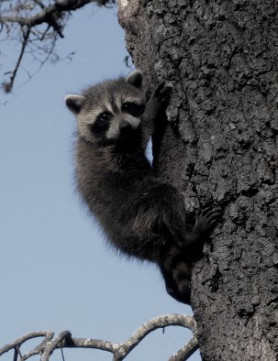
________________________________________________
Margo Tamez (1962 – ) was born in Austin, Texas, and grew up in San Antonio. A teacher and activist, Tamez earned an MFA in creative writing from Arizona State University in 1997. Her poetry collections include Alleys and Allies(1992), Naked Wanting (2003), and Raven Eye (2007). She received a Poetry Fellowship from the Arizona Commission on the Arts, an Environmental Leadership Award and an International Exchange Award from the Tucson Pima Arts Council. In 2004 Tamez and Joni Adamson organized the Symposium on Globalism and the Environmental Justice and Toxics Movement in Tucson AZ https://www.poetryfoundation.org/poets/margo-tamez
Addiction to the DeadI lift my body one leg then another over the cold curve of
the claw-foot tub
Like a walking stick with a colossal cocoon attached
A beast and a mutant I am this
Hooked on the steam of hot water I
Negotiate stretched skin a sore spine the splitting of imminent birth
What do you want
Mammoth a domemoon stomach
Carved by spidery trails former settlement
You in there baby think you’re ready for this
Sing soprano notes sing sounds of upness
Says the midwife
She says go ahead smoke some marijuana you see she’s our
motherherb sacred medicine not for foolery and
selfishness never to be used in that other way you know
she works deeply niece can take care those injuries
bad mister wrecks he set snaring you
this medicine will show you the things killing
all of us
———-
This is what’s necessary I sustain you
You are not ready for me what is out here
Cruel minds separate small girls from girlhood
Fists pound your brother’s brains through the wall
Yellowdrunk eyes from a failed mind lick every pair of
Breasts in the room
At home the smoke shop the wake the burial the ceremony the
Indian-taco stand—
I’m done
———-
Just keep sleeping on my mucous pillow
And don’t push on me
O pouring bowls of light
I see the horrific truths
The most beautiful lie
Will never fool
Never fool
Never fool
The fool
———-
What will be the venting of this
Where will we be
How will the vault be lifted
A tinny sound the drip of persistence
Water into water looking for its level
Always seeking level
No more a drip now a stream continuous motion
Unified atoms
Pearls cells threads cries
The house and early night are each black and black
One a lonesome gaping mouth the other a safe place
To plan
The real fact of spirit leaving body
———-
You push to be born fully alive
You press my addiction to the dead world
Birth me out a muse
———-
Ancestors glide
Landing on the levee where the DDT petroleum and tobacco
Burned my grandfathers’s flesh Emiliano and fueled
My mother’s resistance Chata
Ancestors scold me the lanky child running through
Glossy fields
Crabgrass Indian gum plants johnsongrass
Waxy from spraying the continuous spraying
O freedom of the green revolution O postwar
Stockpiles
O fucking inheritance of the ethnic poor
O how we’ve been fucked
———-
I go through the window opening after opening
Memory buried upon memory that’s how this appears
Skins burst unseam and inside these is me
A skinny dark girl with a dark brain and a dark mind
Seeking the deja-vu Zone of Time Flow
Outside of fear
O no one can see me or see what is real
The invasive spray seeping
Follows me and flows in my blood through decades
To my room and the ease of dark and sleep
Dreaming how I’ll wage war on my raiders
O settlers of the empire
O land thieves
O scalpers of my grandfathers
O slave traders of my grandmothers
Books stand like enemies
Rapists who’ll conspire to kill me
They wrestle me I wrestle back kicking their spines
Splitting their black seeds with my knife the little
Black letters ejaculate from
Their splintered and crushed chaff
My uterus stops the surging jolt of you kicking
You will not miscarry
Not one more
Not ever again
________________________________________________
Ofelia Zepeda (1952 – ) grew up in Stanfield, Arizona, and earned an MA and a PhD in linguistics from the University of Arizona and is the author of a grammar of the Tohono O’odham language, A Papago Grammar (1983). Zepeda’s poetry collections include Ocean Power: Poems from the Desert (1995) and Jewed’l-hoi/Earth Movements, O’Odham Poems (1996). Zepeda was director of the American Indian Language Development Institute. She editsSun Tracks, a book series publishing work by Native American artists and writers, at the University of Arizona Press.
https://www.poetryfoundation.org/poets/ofelia-zepeda
She always got mad at him
every time he came home in the middle of the morning
with his pant legs wet.
She knew he had fallen in the ditch again.
His legs were not strong enough to be straddling ditches.
He was too old to be walking over temporary dikes.
She wished he didn’t do that, but sometimes he had to.
She sometimes imagined him falling over backward in one of the irrigation ditches,
his head hitting hard cement,
his body slowly sinking into the water.
Water that was only three feet deep.
A harmless three feet of water,
where children played,
and ladies sometimes sat and dipped their feet,
especially on hot summer evening.
She knew he would drown,
she knew it was bound to happen sometime.
As far as the eye could see,
flat, green fields appearing to end at the foot of distant mountains.
Mountains, a reminder of what the fields once looked like.
Fields saturated with water pulled from its secret storage place
beneath the earth’s surface.
We are called “the people of the cotton fields”
because of the labor our families did.
For us there was no reservation, no Housing & Urban Development, no tribal support.
We were a people segregated in row houses
all lined up along the roads of our labor.
It is a muggy summer evening.
My father, my sister, and I sit on the east side of the house finding shade against the still-hot setting sun.
The change from brilliant white sun to blue and gold sunset and finally,
to warm darkness, a change we anticipate for brief relief.
On this evening the anticipation is shattered.
A boy comes to the house. He gestures for my father to come to him, out of our hearing.
With what the boy says to him my father moves quickly.
As quickly as his stiff back and legs can move him.
Back and legs broken and fused from when he was a cowboy.
He rushes by, throwing the kitchen door open, grabbing his hat.
He gets into his truck and drives away.
We pay him no mind other than for the fact that he is rushing.
A second later my mother comes out of the house and with a single motion pulls her apron off.
In a tone I recognize as signifying something is wrong, she instructs us to come with her.
She starts in the direction of a cotton field a few hundred yards from our house.
My sister and I walk beside her.
Saying nothing.
Her hands wring the towel she carries with her.
This towel, a multipurpose kind of thing.
Women carry it to fan themselves,
to wipe sweat, to cover their heads and eyes from the sunlight, to shoo away kids, dogs, flies.
I remember once a student of mine, out of habit, brought her towel with her to summer school at the university.
Whenever we see each other on campus during a summer session we always laugh about it.
We continue to walk, stepping over the ends of rows of cotton.
Rows of cotton my family and I know well.
In early summer we walk the rows to thin out the growth,
and later we walk to chop the weeds somehow immune to chemicals.
And in the winter, at least before the machinery, we pick the cotton from their stalks.
Now I can’t begin to imagine how many miles we have all walked,
up and back, up and back along these rows.
We walk alongside her.
The setting sun maintains a continuous pounding on our backs,
the humidity from the damp fields is warm, it rests on our shoulders like tired, sweaty arms.
She heads toward the irrigation ditch.
The ditch is dirt, not cement, it is wide, muddy, and slippery.
The water is shallow.
I see my father’s truck pulling up on the opposite side.
In the front seat there are women, and in the back, men.
The men wedge their feet in between plastic and aluminum irrigation pipes, mud-caked shovels, boots, and hoes.
Equipment in the back of his truck all for the purposes of working fields.
I remember the hoe he carried.
It was big, with a blade that held an edge well and got the work done.
I recall purchasing a hoe for my home and being particularly unsatisfied with the craftsmanship.
“They call this a hoe?” I said to my husband. It had a skinny neck, and no blade to speak of.
The handle was too thin, causing blisters.
Once in awhile I look around for the type of hoe my father carried. I found one once, but didn’t have money to buy it.
In slow motion,
weighed down by the heat,
the women begin to slide across the bench of the pickup truck.
They slowly step out of the cab, appearing as a single long strand of woman, emerging.
In cautious unison they walk toward the edge of the ditch.
My mother, as if connected to them by an invisible string,
is pulled toward them from the opposite side.
Their movement is dreamlike. They peer into the muddy water.
And as if with a shared nervous system, their hands motion the towel each is carrying,
motion it to just above their eyes, covering their faces.
With a single vocal act they release from their depths a hard, deep, mournful wail.
This sound breaks the wave of bright summer light above the green cotton fields.
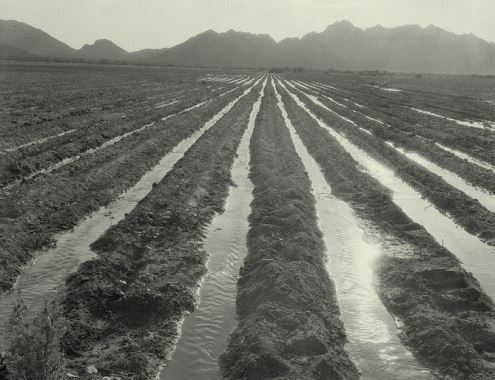
________________________________________________
Joy Harjo (1952 – ) is a poet, musician, author, activist and teacher. Born in Tulsa, Oklahoma, she is member of the Mvskoke tribe, and a highly influential figure in the second wave of the artistic Native American Renaissance. She studied at the Institute of American Indian Arts, earned her undergraduate degree at the University of New Mexico, and an MFA from the University of Iowa’s Creative Writing Program. Harjo is the recipient of many awards, including the 2009 Eagle Spirit Achievement Award and the Wallace Stevens Award in Poetry by the Academy of American Poets https://www.poetryfoundation.org/poets/joy-harjo
Perhaps the World Ends HereThe world begins at a kitchen table. No matter what, we must eat to live.
The gifts of earth are brought and prepared, set on the table. So it has been since creation, and it will go on.
We chase chickens or dogs away from it. Babies teethe at the corners. They scrape their knees under it.
It is here that children are given instructions on what it means to be human. We make men at it, we make women.
At this table we gossip, recall enemies and the ghosts of lovers.
Our dreams drink coffee with us as they put their arms around our children. They laugh with us at our poor falling-down selves and as we put ourselves back together once again at the table.
This table has been a house in the rain, an umbrella in the sun.
Wars have begun and ended at this table. It is a place to hide in the shadow of terror. A place to celebrate the terrible victory.
We have given birth on this table, and have prepared our parents for burial here.
At this table we sing with joy, with sorrow. We pray of suffering and remorse. We give thanks.
Perhaps the world will end at the kitchen table, while we are laughing and crying, eating of the last sweet bite.

________________________________________________
Through hardship and good times, through childhood and old age, the drums in our chests beat out the rhythm of life, connecting us each to the other.
________________________________________________
Visuals- Red tulip
- Young raccoon climbing a tree
- Clawfoot tub
- Irrigated field of cotton seventy miles from Phoenix, Arizona – May 1937, by Dorothea Lange
- Rustic farm kitchen table
Word Cloud photo by Larry Cloud
Share this:- More

